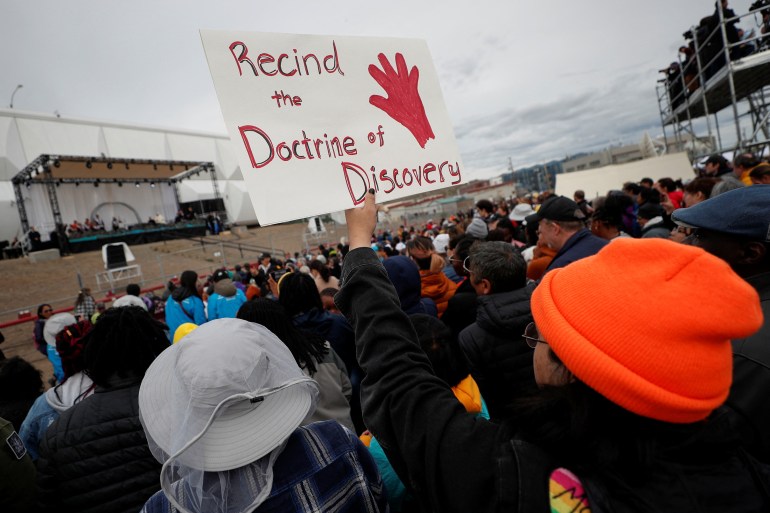Pope Francis apologises again as Canada visit wraps up in Nunavut
Pope’s six-day tour of Canada is ending in northern territory of Nunavut, where he met residential school survivors.

Warning: The story below contains details of residential schools that may be upsetting. Canada’s Indian Residential School Survivors and Family Crisis Line is available 24 hours a day at 1-866-925-4419.
Pope Francis has apologised once more for the “evil” perpetrated by members of the Catholic Church at residential schools, as he wrapped up a six-day “trip of penance” to Canada that has drawn mixed reactions.
Keep reading
list of 3 itemsCanada police arrest former priest for residential school assault
‘A healing journey’: Residential school survivors and the Church
The pope travelled to Iqaluit, capital of the northern territory of Nunavut, on Friday to privately meet residential school survivors and attend a public event before flying back to Rome.
He shook hands with members of an Indigenous delegation who were there to welcome him upon his arrival in the city, home to about 7,700 people, and was greeted by applause at the start of the event, which began with traditional Inuit singing and dancing.
“A short while ago, I listened to several of you who were students of residential schools. I thank you for having had the courage to tell your stories and to share your great suffering, that I could not imagine,” Pope Francis told the crowd.
“This only renewed in me the indignation and shame that I have felt for months … I want to tell you how very sorry I am, and to ask for forgiveness for the evil perpetrated by not a few Catholics, who in these schools contributed to the policies of cultural assimilation and enfranchisement.”
At the start of the week, the pope apologised for the first time in Canada for residential schools, the forced-assimilation institutions rife with abuse that more than 150,000 Indigenous children were obligated to attend for decades between the late 1800s and 1990s.
“I humbly beg forgiveness for the evil committed by so many Christians against the Indigenous peoples,” he said during an event on Monday in Maskwacis, near Edmonton in the western province of Alberta, describing the effects of the institutions as “catastrophic”.
The Catholic Church ran a majority of the 139 federally mandated residential schools that operated across Canada, which a commission of inquiry in 2015 determined amounted to “cultural genocide”.
For decades, Indigenous leaders had called on the church to apologise for its role in the residential school system, and the papal apology offered this week has been welcomed by some survivors as an important step in the path to healing.
Others have called on Pope Francis to go further and acknowledge the Catholic Church’s institutional role in the harms committed at residential schools, not just apologise for the actions of members of the church.
“Despite this historic apology, the Holy Father’s statement has left a deep hole in the acknowledgement of the full role of the Church in the Residential School system, by placing blame on individual members of the Church,” Murray Sinclair, the former chair of the Truth and Reconciliation Commission of Canada (TRC), said in a statement this week.
“It is important to underscore that the Church was not just an agent of the state, nor simply a participant in government policy, but was a lead co-author of the darkest chapters in the history of this land,” Sinclair said.

Indigenous leaders and community advocates also have urged Pope Francis to rescind the Doctrine of Discovery, a concept laid out in 15th-century papal bulls that stated European colonialists could claim any territory not yet “discovered” by Christians.
The papal bulls played a key role in the European conquest of the Americas, and their effects are still felt today by Indigenous peoples across the region.
“These Papal decrees became the basis for the legalized possession of all lands on North America, which we call Turtle Island. It remains ingrained in the constitutional, legislative, and legal systems in Canada and the United States,” the Haudenosaunee External Relations Committee said in a statement on Wednesday.
“An apology to Indigenous Peoples without action are just empty words. The Vatican must revoke these Papal Bulls and stand up for Indigenous Peoples’ rights to their lands in courts, legislatures and elsewhere in the world.”
Meanwhile, a major demand of Inuit communities in Nunavut has been the extradition from France of a Catholic priest accused of sexually abusing children in the northern territory, where he was based between the 1960s and 1990s.
Canadian media outlets reported this week that the Department of Justice said it had made an extradition request for Johannes Rivoire. It did not provide further details.
When @Pontifex arrives in Nunavut will he commit to help with the extradition of predator Johannes Rivoire who is being protected by @theoblates in France?
Last year Mumilaaq Qaqqaq and I walked with elders Piita Irnaq and Evelyn Korkmaz to demand justice for the survivors. pic.twitter.com/Wx5IjtoNVN— Charlie Angus (@CharlieAngusNDP) July 26, 2022